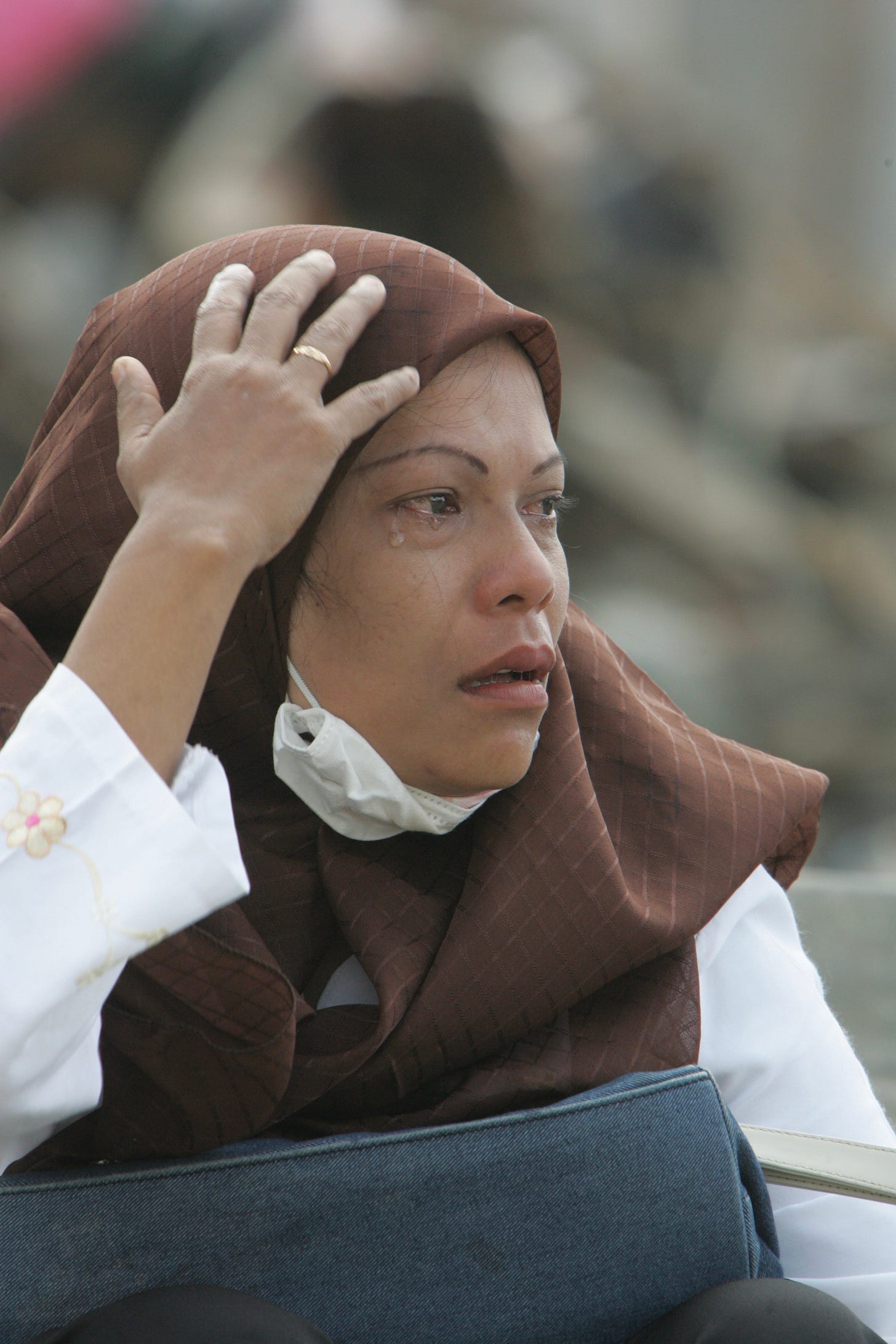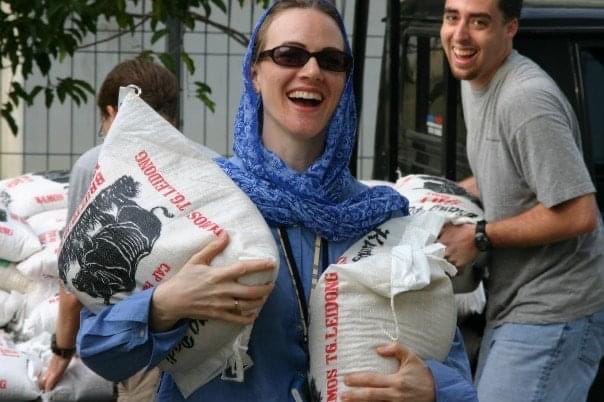Preparing for the Indonesian Tsunami 20th Anniversary
Lessons in Cross-Cultural Communication, Bridging Cultures and Trauma Recovery From My Lived Experience in Disaster Relief
In just a few days we’ll be remembering the friends we lost in the Indonesian tsunami that struck December 26, 2004. I was an aid worker there both before and after the tsunami. I’ll get to a portion of my story in a minute, but first, let’s talk about how our once isolated world is no longer so isolated.
We live in an increasingly interconnected world, where businesses, communities, faith spaces and ideas span continents. Yet, despite our interconnectedness, many of us still struggle to bridge the gaps created by cultural differences. Leaders are faced with the challenge—and opportunity—of fostering environments where different perspectives thrive and collaboration transcends cultural boundaries from Silicon Valley where I now live and work to Indonesia where I lived and worked for 10 years.
As someone who has lived and worked on three continents, I’ve seen firsthand how understanding and embracing cultural differences can transform organizations. At the same time, I’ve also experienced the pitfalls of workplace cultures that fail to foster inclusion, psychological safety, and respect. These experiences inspired me 3 years ago to start A World of Difference podcast, where I invite different subject matter experts to share their thought leadership on the podcast.
I keep hearing many say that 2025 is going to be a difficult year. While I am not a pessimist, I recognize that both here in the US where I now live and in countries where I travel on business to work, there are some key reasons to brace ourselves for crises that may come with risk management strategies to prepare ourselves.
One way I have gained skills in risk management, crisis management and change management is through listening to understand those from cultures and perspectives that are different from my own. On A World of Difference podcast, I interview people from different perspectives to learn and gain skills in how to face obstacles with tools and wisdom from others.
I share stories, strategies, and actionable tips on:
1. Navigating the complexities of global environments.
2. Leading with emotional intelligence and cultural awareness.
3. Building psychologically safe environments for those in our circles of influence.
4. How leaders can address bias, foster inclusion, and cultivate belonging.
This isn’t just about intercultural dynamics—it’s about equipping difference makers like you to build teams and communities that thrive on their differences. We simply cannot afford to be isolationist in our workplaces and our communities. It is a risk to not gain the skills of learning to communicate and lead across the cultures of the globe.
The Power of Cultural Intelligence in Leadership
Cultural intelligence (CQ) isn’t just a buzzword—it’s an essential skill for modern leaders. Research shows that leaders with high CQ are better at:
• Managing global teams.
• Navigating cross-cultural negotiations.
• Innovating by leveraging differences in perspectives.
Here are three ways to increase your CQ today:
1. Learn Actively: Immerse yourself in the histories, languages, and traditions of those in your workplaces and communities. Being curious about their holidays, traditions, histories, tragedies, triumphs and values is a great start. Lived experience varies tremendously across cultures.
2. Adapt Your Communication Style: Recognize when direct vs. indirect communication is more effective. Pay attention to body language which is 55% of how humans communicate. When crises come, how we communicate will be key in getting through it together. We need each other to get through hard times in life and work.
3. Create Opportunities for Inclusion: Actively seek input from all voices, especially those who are often overlooked. Invite the quiet ones to share their perspectives.
By honing your CQ, you’ll be better equipped to lead in a globalized world.
Personal Story:
I’ll never forget a cross-cultural cohort I led in Indonesia. The challenge? Bringing together a group of community development workers and educators with vastly different backgrounds, languages, and priorities. At first, there were misunderstandings. However, by the end of the 6 months of the cohort, we had fostered mutual respect and collaboration. It wasn’t easy, but it was worth it. This experience taught me that leadership is about listening, adapting, and creating space for everyone to thrive whether you have different ways of speaking, ways of dressing or foods you eat. Cultivating psychological safety to ask questions, to be curious and to have a growth mindset proved to help the cohort achieve the outcomes I was hoping they would achieve.
We went on to achieve outstanding outcomes together in disaster relief once the tsunami hit that region 20 years ago, and provided an opportunity to make a difference through disaster relief and community development over the next 5 years of working together in Banda Aceh. I was so glad for the 6 months prior to have led this cohort, and for seeing these leaders bring those cross-cultural skills to work once the UN and other NGOs showed up to help too.
Leading cross-culturally often means giving the support and resources needed for those we mentor, coach and lead to thrive in a world where many perspectives abound. You never know when a crisis or disaster will strike. Being prepared with the skills needed for the chaotic moment of NGOs from around the world showing up with an enormous endeavor of coordinating those efforts from aid workers from a vast array of cultures and values was key to our successful outcomes in disaster relief and community development. As the Boy Scouts love to say, “Always be prepared.” Being prepared means having the cross-cultural skills to face the leadership challenges that will inevitably come our way in 2025 and beyond.
As we are just 5 days away from commemorating the 20th anniversary of the Indonesian tsunami that occured that fateful Sunday morning of December 26, 2004, I remember those days with an intense lament as well as a heartfelt gratitude to have been able to roll up my sleeves alongside my Indonesian friends and fellow aid workers from the UN and other international NGOs around the world as we helped in the most devastating natural disaster of our generation.
My friends Nana and Ayah are always first on my mind as I grieved with them upon hearing their precious baby girl was swept from their arms as they climbed the stairs of a middle school near their house on the beach. That cruel day, while the waves rose higher and higher, a woman pulled Ayah’s arms repeatedly in desperate need of help to prevent herself from drowning. The last they saw of their precious 1-year-old baby girl was her screaming “Daddy, Daddy,” in Indonesian. The words haunted her loving father, and her mom who was my good friend before the tsunami shattered her heart into rubble.
This is only one of many stories that have gravestones in my heart as I remember their precious lives and hold many questions unanswered. I hold their grieving faces in my memory, and although I will never come close to knowing what their painful lived experience did to their minds, bodies and souls, I hold space for the lament each year on Dec 26.
The stories I sat and listened to with shared tears, and the bags of rice I handed out were full of the most devastating heartbreak and the most profound beauty of leaning on each other I have ever experienced. It was my cross-cultural skills that allowed the words that were shared with me, and that I translated for a pediatric trauma specialist to bring healing and hope to survivors who were my friends. I am so thankful I had those skills for they allowed me to enter into the pain and bear witness to grieving moms, dads, and loved ones in ways words so often can never quite describe.
Being a bridge-builder between cultures was something I learned as a child growing up as a third culture kid in international schools in Costa Rica and Venezuela. I honed those skills through my multiple degrees, and through my learning to speak 6 languages. My lived experience gave me opportunities to learn and listen to those around me, and I carry the lessons that Indonesians in particular taught me as we learned to communicate with each other, and after my many linguistic and culture faux pas as I was learning like a baby learning to speak.
I am eternally grateful to my global friends who have taught me, let me lean on them and let me learn from them. The mutual support has made such a difference to me in the midst of me hoping to make a difference around the world with my work. I pause once again to say a heartfelt “thank you,” and “terima kasih” to my Indonesian friends in particular for all you gave me the opportunity to do and for the honor of walking through pain and suffering with you to find the light and hope after unimaginable tragedy 20 years ago. I will be shedding tears on Dec 26 as I remember the babies of my friends who were lost at sea, the whole households who were washed away, and for the loved ones we all miss with heartbreak that words cannot describe while hearts deeply feel.
I don’t have any idea what 2025 will bring. I do know that I want to be prepared for whatever this coming year holds for this beautiful world we all call “home.”
The world is facing some significant challenges, and leaders who upskill with cross-cultural communication and cultural intelligence will be the ones leading us through these obstacles to overcoming them together.
Call to Action:
I want to hear from you! What’s the biggest challenge you’ve faced in leading a diverse team? Reply to this post or comment below, and I might feature your story in an upcoming newsletter.
If you enjoyed this issue, please share it with friends, colleagues, or anyone interested in inclusive leadership. Together, we can create workplaces that truly bridge cultures.
Final Note:
Stay tuned for updates from A World of Difference podcast where I dive deeper into these topics and share actionable frameworks for creating workplaces that are not only full of different perspectives across cultures, generations, cognitive diversity and gender differences, but are also inclusive and effective.
Thank you for being part of this journey. Together, we can build a world where leadership knows no borders, and where we are prepared to lean on each other with whatever waves this next year brings our way. Together, we will stand strong and find higher ground.
Keep making a difference,
Lori
Subscribe: Stay inspired with insights on leadership, culture, and inclusion. Subscribe now to never miss an issue!
Share: Loved this newsletter? Share it with your network! Let’s grow this community of bridge-builders.







